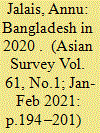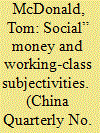| Srl | Item |
| 1 |
ID:
179260


|
|
|
|
|
| Summary/Abstract |
Early in the COVID-19 pandemic, Bangladeshi economist Mushfiq Mobarak argued that in developing countries, lockdown-based social distancing would not be feasible to mitigate its spread. This was because they would be unable to impose restrictions, undertake mass testing, or provide adequate safety nets to the poor. Bangladesh was one of the first countries to allow the reopening of work places (as early as April 28, 2020), especially in the export-oriented garment industry, and has done economically better than its South Asian counterparts. A crucial enabling factor for this pandemic-era economic growth has been the explosive boom in digital money. On the downside, free speech has been sharply curtailed, and women’s futures were further jeopardized when the garment industry was severely hit by order cancellations. But perhaps the most frightening development is the effect of climate breakdown and the mass movement of populations within Bangladesh as well as in and out of the country.
|
|
|
|
|
|
|
|
|
|
|
|
|
|
|
|
| 2 |
ID:
173854


|
|
|
|
|
| Summary/Abstract |
Scholars of Chinese society have predominantly regarded the region's money to represent an unusually “social” artefact. The dramatic proliferation of “digital money” services within Chinese social media platforms in the last decade would seem to further confirm the social character of Chinese money. I present a comparison of the diverse views held by migrant factory workers in Shenzhen towards different digital payment platforms which, however, suggests that rather than digital money necessarily being more or less social, different platforms instead extend the possibilities of sociality in varying ways. I argue that acknowledging the production of such novel working-class subjectivities through digital money ought to be central to efforts to assess the potential of these technologies for addressing the social, institutional and economic exclusions faced by Chinese migrant labourers. This in turn can enrich our understanding of the emergence of a new “digital working-class” in China by revealing how such contemporary working-class subjectivities are shifting, contextual and processual in nature.
|
|
|
|
|
|
|
|
|
|
|
|
|
|
|
|